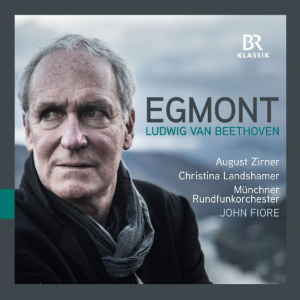
Ludwig van Beethoven (1770-1827)
Egmont, Overture and incidental music Op. 84 (1810)
Overture Zur Namensfeier Op. 115 (1815)
August Zirner (narrator)
Christina Landshamer (soprano)
Munich Radio Orchestra/John Fiore
rec. 2022, Studio 1, Bavarian Radio, Munich
German text and English translation of the two songs included, but not of the narration
BR KLASSIK 900340 [56 + 43]
Beethoven wrote several sets of incidental music, but only one really inspired him: the commission to write music for a production of Goethe’s play Egmont. The play is set in the sixteenth century and deals with an episode in the Eighty Years War of the Dutch against Spanish rule. The subject is the attempted rebellion of Count Egmont of the Netherlands against , the Duke of Alba, an agent of the Spanish occupation. His arrested, his beloved Klärchen (sometimes spelled Clärchen) intercedes in vain for him and commits suicide. Egmont is led off to execution but dies a martyr predicting freedom for his people. The subject had an obvious appeal for Beethoven, with the themes of rebellion against tyranny, faithful love and freedom recalling Fidelio of a few years before.
Beethoven’s music consists of the Overture and nine numbers:
- Song ‘Die Trommel geruhret’
- Entracte I
- Entracte II
- Song ‘Freudvoll und leidvoll’
- Entracte III
- Entracte IV
- Music for Klärchen’s death
- Melodrama ‘Süßer Schlaf’
- Victory Symphony
The songs were written for the role of Klärchen by Goethe to be set to music, and Beethoven took pains to make sure that their first performer, who was not a trained singer, could manage them. The Entractes sum up the feeling of the drama at the point reached at each one; they are short symphonic numbers in Beethoven’s mature style. The third is interrupted by a narration and then resumed. The melodrama, in which music alternates with the spoken word, is a scene for Egmont in which he has a dream of Klärchen after her death; both the use of melodrama and the vision of the beloved recall Fidelio. The final victory symphony, anticipating the eventual triumph of the rebellious cause, is the same as at the end of the overture.
This recording presents the same performance twice over: on the first disc the musical numbers are interspersed with narration in German explaining the action of the play and making it clear how the musical numbers fit in. This narration was written by the Austrian poet Franz Grillparzer, and it is used here in a revision by August Zirner, the narrator here. On the second disc the musical numbers are presented without any intervening material. I need to say at this point that the booklet includes the text and English translation of the two songs but not of the narration. The two-disc set comes in a compact case and is priced at little more than for one disc only.
The recording begins with a vigorous performance of the well-known Overture. The musical numbers are then nicely rendered, with Christina Landshamer giving attractive renderings of her two songs. The orchestral playing in the Entractes is good, if not outstanding, and the final victory symphony suitably jubilant.
On the second disc there is an additional item, the Overture Zur Namensfeier. Beethoven had had this in hand for some time before he finally finished it in 1815 on the birthday of the emperor, hence its name. Frankly, it is a competent but undistinguished piece of hackwork.
The recording is good and the booklet gives the necessary background to Egmont, though it does not mention Zur Namensfeier. Rather strangely, there are two versions of the cover picture; my copy had a photograph which I presume is of John Fiore, but there is another version which has an impressive crown.
There are several other recordings of the incidental music to Egmont, such as those by Segerstam, with some interesting additional music (review), and Häkkinen (review). However, my comparison has been with the classic version recorded in 1969 by George Szell with Pilar Lorengar and the Vienna Philharmonic for the bicentenary celebrations. This was remastered and issued on CD in 1996. The singing and playing is a whole class above that of Fiore’s perfectly reasonable version, and, though currently deleted, is easily available secondhand. However, the recording, though acceptable, now shows its age and if you want a modern version, and don’t mind the omission of the text of the narration, this may suit you.
Stephen Barber
Help us financially by purchasing from





















